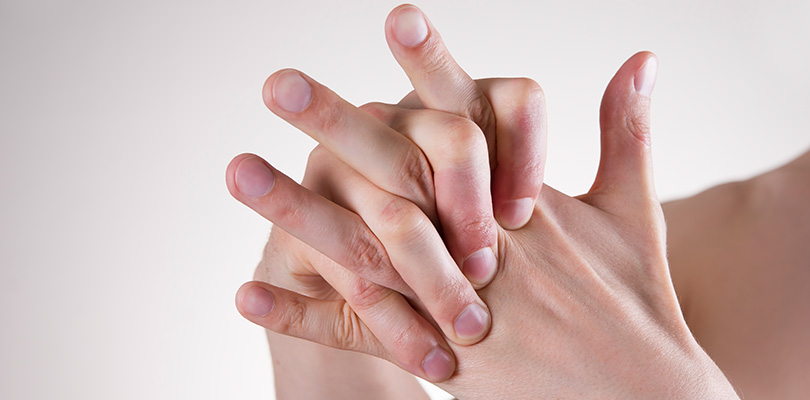Does Cracking Your Knuckles Cause Arthritis?
We’re all familiar with the sound of someone cracking their knuckles.
When you’re the one bending your fingers and creating that popping sound, it’s both satisfying and relieving. Others may consider this a form of audible torture; they cringe at the noise and maybe give the advice that has been offered time and time again, “If you keep cracking your knuckles like that, you’re going to end up with arthritis."
This has been a longstanding statement and seems plausible as cracking knuckles sounds horrible for your joints.
Why Do People Crack Their Knuckles?
If there is even the potential to give yourself arthritis by knuckle cracking, you have to wonder why people would even do it.
For the most part, knuckle cracking has become a habit – nervous or otherwise – and if you ask any nail-biters, smokers, or coffee drinkers out there, habits aren’t easy to break.
A big part of knuckle cracking is the relief afterward; it leads to a short-term fix which loosens joints and improves mobility. This action results in what has been called a “therapeutic release" and is sometimes thought of as a vehicle for easing stress.
Osteoarthritis and Cracking Joints
Osteoarthritis is generally the concern when it comes to cracking knuckles. This type of arthritis causes cartilage to erode and has been referred to as “wear and tear" arthritis.
The contributing factors to this form of arthritis are genetic traits or defects regarding bone structure and cartilage. Obesity or excess weight can make the condition worse.
Also, repetitive injury to the joints can be a risk factor, as well as the weakness of the muscles supporting a joint can limit movement and contribute to cartilage breakdown.
Other factors to arthritic inflammation of the joints are old age or the mechanical stress of repetitive tasks over time.
It sounds like knuckle cracking might fit under the umbrella of osteoarthritis, but with further investigation, you’ll find out that it is not a contributing factor to arthritis at all.
The Physiology of "Knuckle Cracking"
To better understand what is happening in your joints, you have to look at the physiology of the joint itself.
A small capsule (also referred to as a synovial capsule) covers each joint. Inside this capsule is a slippery synovial fluid, which is both a lubricant to reduce friction around the joint and a nutrient supplier for the surrounding bones.
The synovial fluid cushions the joints and protects the bones from rubbing against each other. Since the body has this fluid as a barrier between bones, it begs the question: how is it even possible to crack your knuckles?
If we look at the action of knuckle cracking itself, you might be surprised to find out that you’re not actually “cracking" anything. The sound is a quick movement of fluid. Several gases within the body dissolve continuously in the synovial fluid.
When you crack your knuckles, you’re pulling the bones in a joint away from each other and creating some space which needs to be filled.
The dissolved gases from the synovial fluid get pulled into the area in the form of microscopic bubbles, which collide into each other to merge into a larger bubble. When fluid rushes back into the space, the bubble bursts and creates that popping sound.
The gases re-dissolve in the synovial fluid and reset the person’s ability to re-create the sound. The dissolving process takes several minutes, which is the reason you can’t crack your knuckles again right away.
Is Cracking Your Knuckles Harmful?
In spite of the fact that cracking your knuckles doesn’t cause arthritis, there still may be a few reasons to try and stop the habit.
After decades of bubble-popping, you may see some cartilage damage around the joint. Weathering conditions of body parts is a normal part of the human experience as we age, so it might be difficult to place blame on knuckle popping in this situation.
Possible side effects of cracking your knuckles are rare occurrences of thumb and finger injuries and ligament damage, dislocation of the tendons, possible hand swelling, and knuckle pads. After years of cracking, these folks may also experience reduced grip strength.
Where Did the Knuckle Cracking Causes Arthritis Myth Come From?
Where did this idea of knuckle cracking causing arthritis come from?
Sometimes people who already have arthritis have their joints crack due to damage to the cartilage. There is no increased risk to get arthritis if you crack your knuckles and there is no known evidence to suggest it is linked to hand arthritis.
If you’re concerned about your joint or bone health, be sure to talk to your physician. They will be equipped to answer your questions and advise you on anything you can be doing for your joint health.
We can file the idea that cracking your knuckles causes arthritis alongside the notion that if you make silly faces, your face will freeze that way. If you are compelled to continue cracking your knuckles by habit, you may want to stop – even if it’s just for the relief of the ears of those around you.
